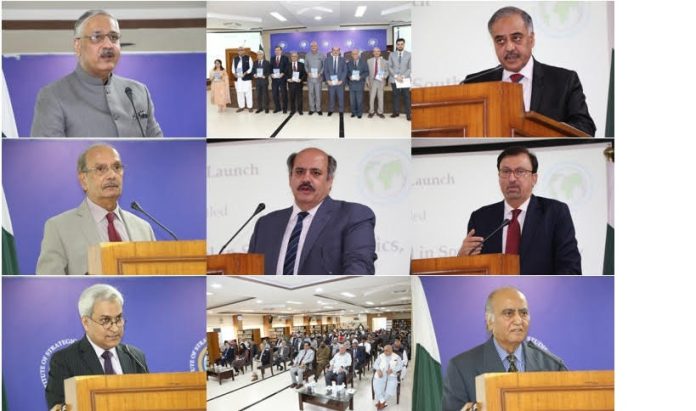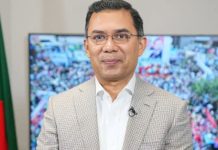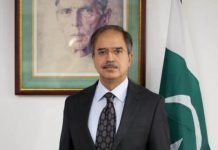Thursday, July 11, 2024
The Arms Control and Disarmament Centre (ACDC) at the Institute of Strategic Studies Islamabad (ISSI) organized a book launch titled: Nuclear Arms Control in South Asia: Politics, Postures, and Practices, authored by Professor Dr. Zafar Nawaz Jaspal, Dean of Social Sciences and Professor at the School of Politics and International Relations, at Quaid-i-Azam University, at the ISSI. The occasion was graced by General (Retd.) Zubair Mahmood Hayat, former Chairman Joint Chiefs of Staff Committee (CJCSC), as the chief guest. Ambassador Tahir Hussain Andrabi, Additional Secretary, (ACDIS) MOFA; Dr. Zafar Iqbal Cheema, Founding President SVI & former Dean of Social Sciences, QAU; and Air Commodore Khalid Banuri, Advisor Jinnah Centre for Character & Leadership (JCCL), AHQ were among the discussants.
The chief guest Gen. Zubair Hayat, commended the author for writing this timely book that was academically rich and solid. The analysis of India’s and Pakistan’s doctrines and postures were interesting and well-researched and had enriched the debate. He emphasized the importance of authentic Pakistani narratives, such as contained in this book. He stated that the core element of Pakistan’s security was nuclear deterrence. Intensifying major-power competition and global trends in arms control were not encouraging and were emulated at the regional level. He added that South Asia lacked strategic stability due to India’s ‘Hindutva-driven’ ideology. India’s belligerent behavior in the region was getting advanced due to the ‘exceptionalism’ that major powers granted India. India had used arms control to buy time, includes in political posturing, and pursue look-good strategy. He stated that the Indian pursuit of emerging technologies was adding further stress to South Asia. Indian strategic capabilities were being expanded to the Indian Ocean which was very dangerous but there was a muted silence in world capitals. He emphasized that greater security would be achieved if nuclear apartheid was abolished, where India’s exceptionalism was done away with, and when Pakistan was granted access to global export control regimes. He concluded by reiterating: “There is no substitute for hard power, diluting hard power will be fatal.”
Earlier, in his welcome remarks, DG ISSI Ambassador Sohail Mahmood highlighted that in the global nuclear discourse there had been an unrelenting effort to somehow project that Pakistan’s security concerns and its response to develop nuclear capability lacked legitimacy. By this token, several countries had pursued patently discriminatory policies towards Pakistan, which was both unjust and unjustified. Pakistan had pursued a nuclear capability that served its legitimate security needs and the country had not breached any international legal obligations whatsoever. He stressed that it was imperative to proactively advance the counter-narrative — firmly placing Pakistan’s nuclear development in the historical context and in light of constantly evolving strategic environment. He lauded Dr. Jaspal’s book for a strong theoretical framework and realistic assessment of the scope for arms control in South Asia. He also commended the author for his efforts to advance Pakistan’s perspective with clarity. He stated that it contextualizes the nuclear programs of India and Pakistan, exploring their historical development and strategic motivations while evaluating the feasibility of nuclear arms control in the region in the wake of complex geopolitical situation in South Asia.
Malik Qasim Mustafa, Director ACDC lauded Dr. Jaspal’s book which shed light on the theoretical and empirical causes of nuclear proliferation and arms control challenges in South Asia; contained detailed analysis of the transformation of India’s and Pakistan’s nuclear doctrines and postures; and highlighted the impact of emerging technologies that could intensify the conventional and nuclear arms race in South Asia.
In his remarks, Dr. Zafar Iqbal Cheema stated that this was a much-needed book where issues of doctrine, deterrence, compellence, and nuclear postures had been elegantly taken up by the author. He added that the book’s rich academic discourse was equally useful for students and policymakers. Pakistan needed to keep abreast of India’s technological advancements like supersonic missiles, ballistic missile defence, and doctrinal changes. The possibility of the use of nuclear weapons was higher today because of major-power competition and geopolitics, aided by regional players. This also affected the regional dynamics.
Amb. Tahir Hussain Andrabi appreciated the structure of the book, terming it explorative and normative, balanced and rational. He highlighted the politics of nuclear arms control, and shifting trends in the contemporary non-proliferation, including abrogation of treaties painstakingly negotiated; and granting waivers to allies. According to him, global non-proliferation norms were being violated which was having a trickle-down effect in South Asia. He said the so-called ‘Gold Rush’ to emerging technologies which were also destabilizing for South Asia.
Air Commodore (Retd.) Khalid Banuri highlighted the instability in the global arena, creating a trigger-happy situation. As long as states faced security dilemmas they would acquire such nuclear capabilities leading to horizontal proliferation. Appreciating the book, he stated that it walked through the annals of nuclear history and how the future might play out. The book was an easy read and was recommended for students of nuclear politics.
Providing a roundup of the book, Dr. Jaspal stated that it looked at the future implications within the framework of theoretical literature on nuclear weapons vertical proliferation and nuclear arms control; and trends in the global nuclear world order. It also spelled out India’s and Pakistan’s nuclear postures and their rhetorical and practical approach toward nuclear arms control. Further, it looked into the impracticability of the nuclear disarmament approach in South Asia, leaving arms control measures as the only realistic alternative path for strategic stability in a complex regional strategic environment. With emerging technologies, the world stood at the cusp of a technological revolution and complicated South Asian milieu. He concluded that the era of soft power was gone, replaced by an era of vertical proliferation, and hard and military power.
Ambassador Khalid Mahmood, Chairman BOG ISSI, gave his vote of thanks and stated that the book deals with a subject that was vital for Pakistan’s security. Pakistan was a ‘reluctant’ nuclear power and its hand was forced by India. However, strategic stability was being eroded by new emerging technologies that bodes ill for the region.

















